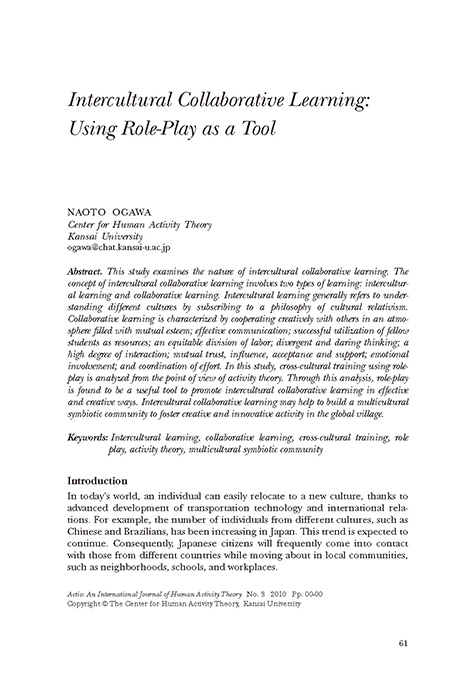
Abstract
Reference

Abstract
This study examines the nature of intercultural collaborative learning. The concept of intercultural collaborative learning involves two types of learning: intercultural learning and collaborative learning. Intercultural learning generally refers to understanding different cultures by subscribing to a philosophy of cultural relativism. Collaborative learning is characterized by cooperating creatively with others in an atmosphere fi lled with mutual esteem; effective communication; successful utilization of fellow students as resources; an equitable division of labor; divergent and daring thinking; a high degree of interaction; mutual trust, infl uence, acceptance and support; emotional involvement; and coordination of effort. In this study, cross-cultural training using roleplay is analyzed from the point of view of activity theory. Through this analysis, role-play is found to be a useful tool to promote intercultural collaborative learning in effective and creative ways. Intercultural collaborative learning may help to build a multicultural symbiotic community to foster creative and innovative activity in the global village.
References
Bell, R. (1987). Social involvement. In J. McCroskey & J. Daly (Eds.), Personality and interpersonal communication (pp. 195-242). Newbury Park, CA: Sage.
Bennett, J. (1986). Modes of cross-cultural training: Conceptualizing cross-cultural training as education. International Journal of Intercultural Relations, 10, 235-254.
Brislin, R. (1989). Intercultural communication training. In M. K. Asante & W. B. Gudykunst (Eds.), Handbook of international and intercultural communication (pp. 441-457). Newbury Park, CA: Sage.
Caplan, G. (1974). Support systems and community mental health: Lectures on concept development. New York: Behavioral Publications.
Caplan, G. (1976). The family as a support system. In G. Caplan & M. Killilea (Eds.), Support systems and mutual help: Multidisciplinary explorations (pp. 19-36). New York: Grune & Statton.
DeNeve, K., & Mary, H. (1997). Role play simulations: The assessment of an active learning technique and comparisons with traditional lectures. Innovative Higher Education, 21, 231-246.
Engeström, Y. (1987). Learning by expanding: An activity-theoretical approach to developmental research. Helsinki: Orienta-Konsultit.
Engeström, Y. (2005). Knotworking to create collaborative intentionality capital in fl uid organizational fi elds. In M. M. Beyerlein, S. T. Beyerlein, & F. A. Kennedy (Eds.), Collaborative capital: Creating intangible value (pp. 307-336). Amsterdam: Elsevier.
Friedman, M. (1983). The confi rmation of otherness: In family, community, and society. New York: Pilgrim Press.
Gudykunst, W. B. (2004). Bridging differences: Effective intergroup communication (4th ed.). Thousand Oaks, CA: Sage.
Herskovits, M. (1950). Man and his works. New York: Knopf.
Johnson, D. W., & Johnson, R. T. (1999). Learning together and alone: Cooperative, competitive, and individualistic learning (5th ed.). Boston, MA: Allyn and Bacon.
Kahn, R. L., & Antonucci, T. (1980). Convoys over the life course: Attachment, roles, and social support. In P. B. Bales & O. G. Brim (Eds.), Life span development and behavior (pp. 253-286). New York: Academic Press.
Kaufman, J. P. (1998). Using simulation as a tool to teach about international negotiation. International Negotiations, 3, 59-75.
Kraus, R. (2008). You must participate: Violating research ethical principles through roleplay. College Teaching, 56(3), 131-136.
Leont’ev, A. N. (1981). The problem of activity in psychology. In J. V. Wertsh (Ed.), The concept of activity in Soviet psychology (pp. 37-71). Armonk, NY: Sharpe, Inc.
Ligorio, M. B., & Van Veen, K. (2006). Constructing a successful cross-national virtual learning environment in primary and secondary education. Association for the Advancement of Computing in Education Journal, 14(2), 103-128.
Linser, R., Ree-Lindstad, N., & Vold, T. (2007, May). Black blizzard: Designing role-play simulations for education. Paper presented at the Seventh International Educational Technology Conference, Nicosia, Turkish Republic of Northern Cyprus.
Mandel, R. (1977). Political gaming and foreign policy making during crises. World Politics, 29(4), 610-625.
Mead, G. H. (1934). Mind, self and society. Chicago, IL: University of Chicago Press.
Meares, R. (2005). The metaphor of play: Origin and breakdown of personal being (3rd ed.). London: Routledge.
Melamed, L. (1987). The role of play in adult learning. In D. Boud & V. Griffin (Eds.), Appreciating adults learning: From the learner’s perspective (pp. 13-24). London: Kogan Page.
Monk, J. (1978). Women in geographic games. Journal of Geography, 77, 190-191.
Oakes, J. (1985). Keeping track: How schools structure inequality. New Haven, CT: Yale University Press.
Robinson, J. A., Anderson, L., Hermann, M., & Snyder, R. (1966). Teaching with international simulation and case studies. The American Political Science Review, 60(1), 53-65.
Shearer, R., & Davidhizar, R. (2003). Using role play to develop cultural competence. Journal of Nursing Education, 42, 273-276.
Shepard, D. (2002). Using screenwriting techniques to create realistic and ethical role plays. Counseling Education and Supervision, 42, 145-157.
Sumner, W. G. (1940). Folkways. Boston: Ginn.
Takamizawa, H. (1989). New method to teach foreign languages and Japanese language education. Tokyo: ALK Press (in Japanese).
Ting-Tooney, S. (1999). Communicating across cultures. New York: The Guilford Press.
Teräs, M. (2007). Intercultural learning and hybridity in the culture laboratory. Helsinki: Helsinki University Press.
Usluata, A. (1997). From conflict to harmony: A heterogeneous group in a business communication class in Turkey. Business Communication Quarterly, 60(1), 124-133.
Vygotsky, L. S. (1978). Mind in society: The development of higher mental processes. Cambridge, MA: Harvard University Press.
Wood, D., & O’Malley, C. (1996). Collaborative learning between peers: An overview. Educational Psychology in Practice, 11(4), 4-9.
Yamazumi, K. (2007). Human agency and educational research. Actio: An International Journal of Human Activity Theory, 1, 19-39.